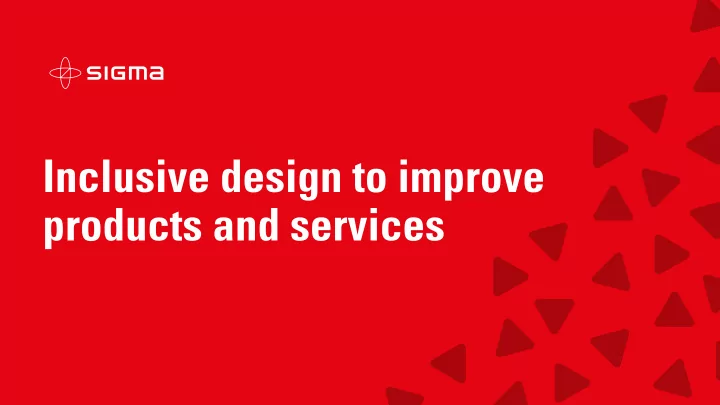

Inclusive design to improve products and services
Hej! Chris Bush Molly Watt Head of Experience Design Accessibility and Usability Consultant @suthen @mollywatttalks wearesigma.com @wearesigma
Thinking about inclusion wearesigma.com @wearesigma
1 billion People with long-term disability worldwide 1 in 7 wearesigma.com @wearesigma
11.2 million 20% People in the UK have some form of disability wearesigma.com @wearesigma
Why inclusion matters wearesigma.com @wearesigma
My story wearesigma.com @wearesigma
Usher syndrome = Deafness + Retinitis Pigmentosa RP is the second most common cause of blindness after aging wearesigma.com @wearesigma
Acquiring a disability ≠ being born with a disability wearesigma.com @wearesigma
My life revolves around technology wearesigma.com @wearesigma
However, technology doesn’t fully compensate wearesigma.com @wearesigma
Anyone can have challenges ‣ Disability is more common than you may think ‣ We will all experience disability at some point ‣ By the age of 45 most of us will need glasses ‣ Yet many websites do not support dynamic text ‣ Many on iPhone use 'Large Text,’ a lot of apps aren’t compatible. wearesigma.com @wearesigma
Who here has blue eyes? wearesigma.com @wearesigma
Accessibility should not be considered as an afterthought, or as ‘help’ but as reasonable built-in adjustments for all... wearesigma.com @wearesigma
What is the best way to design for inclusion? wearesigma.com @wearesigma
The best examples of inclusive design are formed from user needs, not just compliance wearesigma.com @wearesigma
What’s wrong with this picture? wearesigma.com @wearesigma
Designing for extremes wearesigma.com @wearesigma
wearesigma.com @wearesigma
Types of impairment Vision Hearing Motor Cognitive Ability to interact Ability to see, or Ability to hear, or Ability in mentally with a device process visual process acoustic demanding areas; accurately and information information reading, memory, quickly attention, complex concepts or language wearesigma.com @wearesigma
Types of impairment – long term Vision Hearing Motor Cognitive Dyspraxia, Down’s syndrome, Blindness, Hearing loss RSI, arthritis Asperger’s and low vision & and dyslexia, learning colour blindness cerebral palsy difficulties wearesigma.com @wearesigma
Types of impairment – temporary & situational Vision Hearing Motor Cognitive Temporary injury, Medication, Forgot my glasses Communication such as a broken in a noisy wrist tiredness, stress, Glare when using a environment device in bright Carrying a child hangover :D sunlight wearesigma.com @wearesigma
Let’s normalise inclusive design wearesigma.com @wearesigma
Because, when we get it right, it becomes invisible wearesigma.com @wearesigma
Because, when we get it right it becomes invisible wearesigma.com @wearesigma
Video captions wearesigma.com @wearesigma
The different types of assistive technologies wearesigma.com @wearesigma
wearesigma.com @wearesigma
How Molly uses technology wearesigma.com @wearesigma
Your turn ‣ How to enable your phone ‣ How to browse using voiceover (gestures and rotor) ‣ Browsing BBC Sport ‣ What time is today’s Arsenal game? ‣ Try one of your sites (or a personal favourite) and a typical task? ‣ What did you find? wearesigma.com @wearesigma
NVDA wearesigma.com @wearesigma
Your turn ‣ How to browse using NVDA ‣ Browsing BBC Sport ‣ What time is today’s Arsenal game? ‣ Try one of your sites (or a personal favourite) and a typical task? ‣ What did you find? wearesigma.com @wearesigma
What can we do to be more inclusive? wearesigma.com @wearesigma
Often when we think about different devices, we think about the screen-size first wearesigma.com @wearesigma
Input Pointing Voice Touch devices devices & gestures But the ways in which we interact can be wearesigma.com @wearesigma very different
Design for comfort iPhone 4 wearesigma.com @wearesigma
Design for comfort wearesigma.com @wearesigma iPhone 4 iPhone 5 iPhone 6 iPhone 6+
Navigation systems on Design for comfort larger screens can be uncomfortable to use wearesigma.com @wearesigma iPhone 4 iPhone 5 iPhone 6 iPhone 6+
Design hit areas to be easy to click or tap Provide 3-5mm Standard inactive space touch size of around 7-10mm elements wearesigma.com @wearesigma
Help users fix errors Show What the error is Where the error is How to fix it wearesigma.com @wearesigma
Think carefully before using custom controls or very Custom prohibitive controls can be very empowering wearesigma.com @wearesigma
. Design for the full spectrum of your users wearesigma.com @wearesigma
. Can you find any black holes? Content can be hidden if you do not use A tags for actions wearesigma.com @wearesigma
. Don’t force users to remember things they don’t need to Flybe asks you to enter details the system already knows about you (when logged in) wearesigma.com @wearesigma
. Sometimes people want or need a human Being a digital service doesn’t mean you should make it harder for people to engage with a real person. When we run inclusive usability sessions we frequently hear requests for systems to include chat interfaces along with other contact methods (email,phone, etc). wearesigma.com @wearesigma Chat interfaces often provide a valuable way for users who can’t use, or dislike using a phone to get essential support
. Run mixed ability usability sessions for greater depth and alignment of insights wearesigma.com @wearesigma
. Everyone will experience a real need for inclusive services at least once in their lives Consider everyone's journey wearesigma.com @wearesigma
Thank you. Questions? For copies of the slides, handouts, and a set of useful resources (or if you want help or have more questions) Chris.bush@sigma.se - @suthen Molly.watt@sigma.se - @Mollywatttalks
Recommend
More recommend